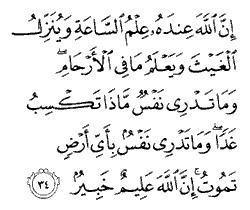Ever Mindful, Samahah, Sending Salawat
Issue 953 » June 30, 2017 - Shawwal 6, 1438
Living The Quran
Ever Mindful
Luqman (Luqman) Sura 31: Verse 34
 "Truly with God lies knowledge of the Hour, and He sends down the rain and knows what lies in wombs. And no soul knows what it will earn on the morrow, and no soul knows in what land it will die. Truly God is Knowing, Aware."
"Truly with God lies knowledge of the Hour, and He sends down the rain and knows what lies in wombs. And no soul knows what it will earn on the morrow, and no soul knows in what land it will die. Truly God is Knowing, Aware."
Ibn Umar related that the Prophet said, "The keys of the Unseen are five, and none knows them except God: none knows the timing of the Hour except God; none knows what is hidden in wombs except God; none knows what is in store for tomorrow except God; no soul knows in which land it will die; only God knows this; and none knows when it will rain except God". According to some accounts, after making this statement, the Prophet recited this verse.
This verse was reportedly revealed in response to a man who asked the Prophet about the Hour and its exact timing, adding, "Our land has dried up. When is it going to rain? And I left my wife pregnant. When is she going to give birth? And I know in which land I was born, but in which land am I going to die?" But according to others, the verse had been revealed before this encounter, and the Prophet simply responded to these questions by saying, "If God wanted to take the soul of a servant in a particular land, He would place within that servant a need, such that he would not cease until he had reached that land," after which he recited this verse.
That no one knows the time or place of death is understood as an admonition to be always prepared for death and thus ever mindful of God. In this vein, al-Tustari is reported to have said, "No soul knows what it will earn on the morrow; that is, [no soul knows] what [counts] for it and against it in what has been measured out from the Unseen. So, be wary of [what has been measured out] by upholding the remembrance of Him and crying out to Him for help, until He Himself takes care of your affair; as He has said: God effaces what He will and establishes."
Compiled From:
"The Study Quran: A New Translation and Commentary" - Seyyed Hossein Nasr
Understanding The Prophet's Life
Samahah
Samahah is a comprehensive term, not easy to define in a few words. It has, nevertheless, been given a definition as "commendable easiness in matters in which people usually incline toward sternness and severity (tashdid) provided it does not lead to a mischief." Samahah is closely associated with the attitudes of liberality, generosity, gentleness, and dignified resistance to temptation and anger, and compassionate forbearance (hilm).
To avoid futile speech is an indication of good faith and a dimension of samahah, as in the following hadith: "Whoever believes in God and the Last Day, let him speak when he has something good to say, or else remain silent." [Muslim] One who practices samahah in his daily life also records an act of merit as in the following hadith: "May the mercy of God be on one who is lenient (samhan) when he sells, lenient when he buys, and lenient when he pays and lenient when he makes a demand." [Ibn Majah]
Compiled From:
"The Middle Path of Moderation in Islam: The Qur'anic Principle of Wasatiyyah" - Mohammad Hashim Kamali, pp. 132-134
Blindspot!
Sending Salawat
Scholars of Islam have reviewed the many verses (ayahs) and narrations (hadiths) that relate to sending blessings (salawat) upon Prophet Muhammad (peace be upon him) and sifted out many, many benefits of doing so. Here is a small sampling:
- Believers receive ten blessings from God for every blessing (salawat) sent upon the Prophet
- God will raise your spiritual rank ten degrees
- Believers receive the rewards of ten good deeds
- God will erase ten of your sins
- A supplication (dua) is more likely to be answered if you close it with a blessing upon the Prophet
- It is a means to being closer to Prophet Muhammad on the Day of Resurrection
- It is a means to having God fulfill your needs
- It will help you to remember something you have forgotten
- It can protect you from poverty
- It will lead to better character and manners
- Your love for Prophet Muhammad, an essential precondition to true faith, will be sustained and increased.
These should be more than enough reasons for a wise Muslim to make a regular practice of sending blessings (salawat) upon Prophet Muhammad (peace be upon him). This is all because God has given us a direct connection to His outpouring of blessings upon Prophet Muhammad and his family by sending our blessings upon them.
Compiled From:
"Being Muslim: A Practical Guide" - Asad Tarsin, pp. 131, 132